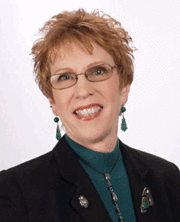 Christie Romero was a respected jewelry historian, gemologist, collector, and author of Warman’s Jewelry, a guide to 18th-20th century jewelry. She was also an appraiser for PBS’s “Antiques Road Show.” She died in September.
Christie Romero was a respected jewelry historian, gemologist, collector, and author of Warman’s Jewelry, a guide to 18th-20th century jewelry. She was also an appraiser for PBS’s “Antiques Road Show.” She died in September.
I interviewed Christie last year for a story in Town & Country. In this unpublished part of that interview, Christie shares her tips for getting the most for your money when buying estate jewelry – and how to avoid rip-offs.
What are the most important things to consider when buying estate jewelry?
I call it the seven criteria: condition, craftsmanship, color, design, demand, scarcity and size. Condition is huge and affects value a great deal. That’s why using a loupe is so important. The first thing I teach people in my workshops is how to use a loupe. Sometimes you can overlook things without magnification. Look for damage and to see if parts are original or if they need repair. Lead solder on precious metal is a bad thing. You have to train your eye to notice these things and anyone can do that. You don’t need special training, it’s just matter of training your eye.
How do you use a loupe? It seems straight forward until you look through one for the first time.
It’s a focus issue. It’s little awkward. You should keep both eyes open – most people tend to close the other eye – and bring the loupe to your eye. People often make the mistake of trying to use it like a magnifying glass. Bring the loupe to the eye, then the piece to the loupe. There’s a certain focal length where it snaps into focus and you can see what you’re looking at very clearly.
How can I tell if a piece of jewelry is authentic?
Authenticity is a huge issue now because of all the reproductions and knockoffs out there. Synthetics have been around a long time but jewelry being made to look old – there’s more of that because of the popularity of antique and period jewelry. With so much money involved, there are going to be knockoff artists. Over the past 10 years, this problem has become rampant and increasingly difficult to deal with.
Does that mean I should always get an expert appraisal?
An appraisal, in general, is important but I don’t think people should rely entirely on that. You need to develop a relationship with a seller and arm yourself with knowledge. Knowledge is what makes a discerning collector and it’s the best defense against rip-offs. It also allows you to create a collection where the whole is worth more than the sum of its parts.
What’s the best way to get that kind of knowledge?
Go to museum shows and auction previews, ask questions, gain experience that will make you a more discerning buyer. Talk to people who have been involved in antique and period jewelry for a long time. Go to workshops like the ones offered at Jewelry Camp.
How important is a stamp or signature?
Very important. A name on a piece makes a sizeable difference. All other things being equal, a signed piece will have more value than an unsigned piece. How much that will affect the price depends on the name.
The market for antique jewelry is no different from the stock market or real estate. It’s a supply-and-demand driven market. So something that is signed is incredibly wonderful and rare. If it’s not signed, there is less guarantee that it’s not a knockoff. Signatures can be knocked off too but in my experience, it’s not that common to knock off a signature. It’s easier to knock off of an unsigned piece.
Next week: more tips from Christine Romero on buying antique jewelry at auction and how to spot swapped-out gemstones.
Related posts:


